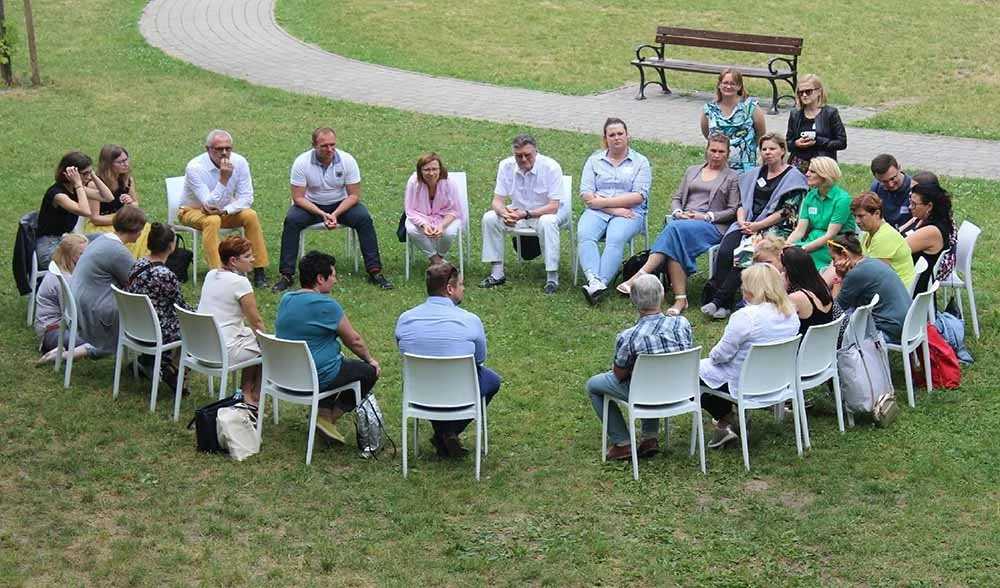Get prepared: Neighborhood
Six-step neighborhood plan - Paula
With a champion in place it's time to launch the Neighborhood Plan. Before you begin, familiarize yourself with the role of “champion.”
This is a suggested step-by-step approach for neighborhood champions and organizers. Remember, each neighborhood is different—adapt processes and materials as appropriate!
1. Invite your neighborhood to participate
2. Facilitate a get-to-know-each-other and ‘mapping’ meeting
3. Create and Distribute Readiness Packets
4. Create a radio network and conduct a check in with the Island ARC
5. Conduct a readiness assessment
6. Facilitate Renewal Meetings
All materials used in this section also appear in the Resource library.
1. Invite your neighborhood to participate
Define your neighborhood
It can be a lane, part of a road, or any area no further than 1.5 miles in diameter.
We recommend neighborhoods be defined as 20 or fewer households. If you are in a water district or HOA the good news is you have an automatic affiliation of multiple households.
If you live south of Mutiny Bay Road, you are in the South Whidbey Prepares area. If you live outside our area, contact our Island County’s Department of Emergency Management DEM@islandcountywa.gov to learn about similar efforts in central and north Whidbey.
Communicate with your neighbors—let each neighbor know you are planning a meeting. Offer a personal invitation to the meeting. Let them know about South Whidbey Prepares and your offer to help organize.
It might be appropriate for you to go door-to-door if there are some neighbors that you don’t know. If your neighbors are already acquainted, an email to everybody might be appropriate. Each neighborhood is different!
Going door to door
To feel more comfortable, you may want to take a friend or another family member as you go around the neighborhood.
Here's what to take with you:
letter from you to leave with your neighbors. Modify the Sample Letter of Introduction for your own use. —Sample letter of introduction PDF
The tri-fold flyer to introduce South Whidbey Prepares to leave with your neighbors —PDF to print, or pick up flyers
Map Your Neighborhood materials to familiarize them with this process. How to order Map Your Neighborhood booklets
A contact sheet for you to get your neighbor's contact information. —Contact Sheet PDF
Sending an email to your neighbors
o A letter from you to email—Modify the Sample Letter of Introduction for your own use. —Sample letter of introduction PDF
o Map Your Neighborhood materials mention—let them know how they can pick one up or you could have them for them or at the meeting.
o Contact info—be sure to ask for any contact info you don't already have
2. Facilitate a get-to-know-each-other and ‘mapping’ meeting
Before the Meeting
Choose a meeting time and place (Tips), schedule with your neighbors. Make it a party!
Review and adapt the materials to determine a process that is appropriate for your neighborhood.
You may also need:
Large paper and marker to draw a map, some may want an easel, table-tops and walls can work.
Forms capturing helpful information from all households who are willing to share it, for instance who has a radio, a chainsaw, CERT training, etc.—PDF
During the Meeting
Provide overall context as appropriate
Nick Walsh, SW Fire EMS, Chief's message—PDF
Watch Scott James of Bainbridge Prepares video together—link to video
Check out the fire Forecasts for the summer
Map Your Neighborhood
Use Sample Questions PDF to determine the appropriate[1] processes for your neighborhood
Use the Map Your Neighborhood documents to
Make a neighborhood map with contact information
Mark gas tanks and gas shut-offs for all participating homes
Define evacuation and shelter-in-place plans
Clarify Provisioning—Food, Water, Resources
Note: These activities are a lot to do. Keep it easy and fun Schedule additional meetings as required.
Gather info sheets from neighbors, let them know you will be best protected as more neighbors share information. Get permission (should we have permission line?)
Encourage people to read Scott’s book, currently we have one for each neighborhood, and they are carried at Moonraker Books. If your neighbors are interested—have a book discussion as a follow-up meeting.
Have a plan of when to meet next to continue discussions and detailed preparations
After the Meeting
Record your neighborhood: Let the South Whidbey Prepares Program Team that you are launched—southwhidbeyprepares@whidbey.com
Register your Neighborhood: Once you have your neighborhood identified and in agreement to organize, be sure to register with the Island County Department of Emergency Preparedness—https://www.cognitoforms.com/islandcounty1/readyneighborssignup
Use sidebars for tips and tricks
Remember sidebars don’t stay aligned with the main text in mobile view, but will stay at the top or drop to the bottom.

